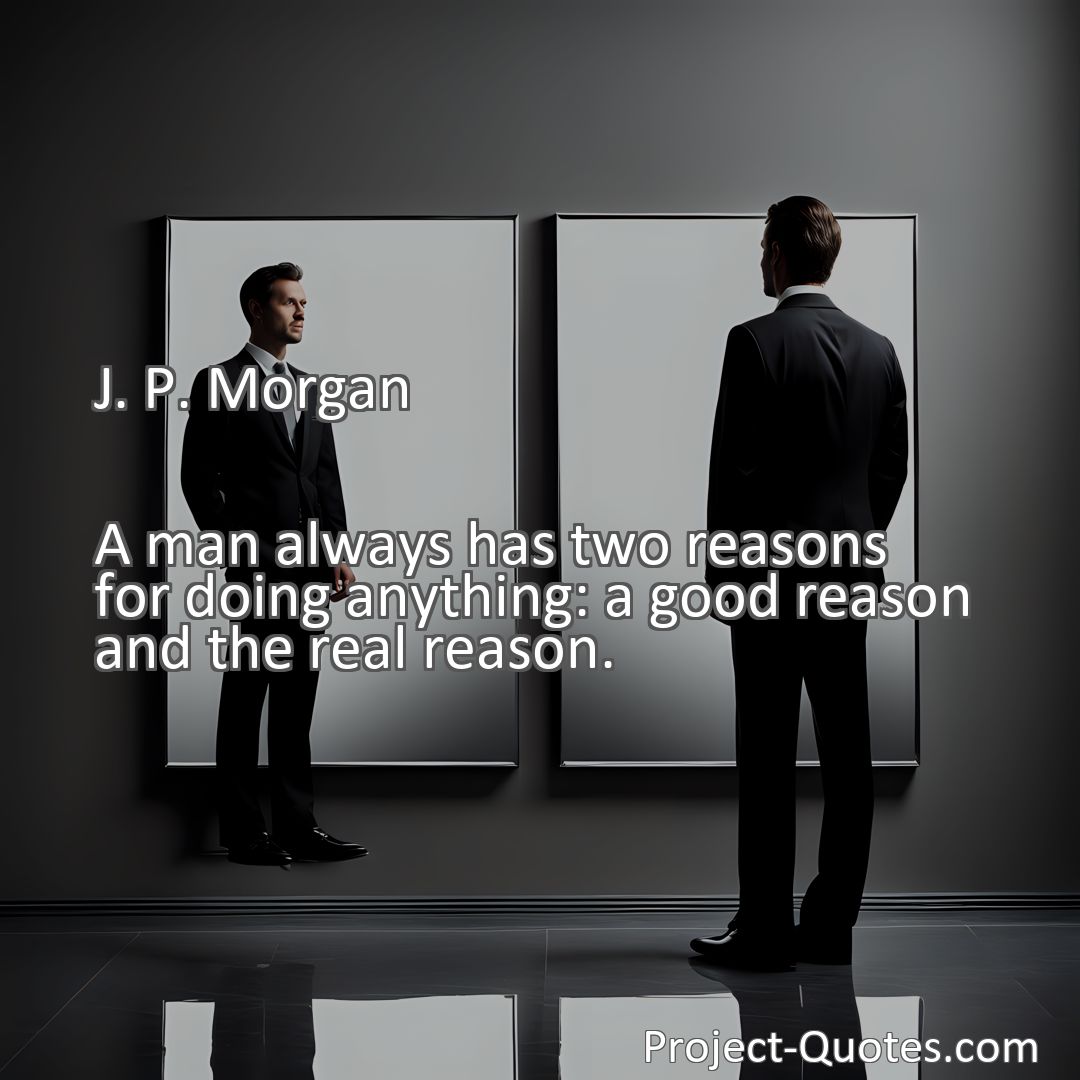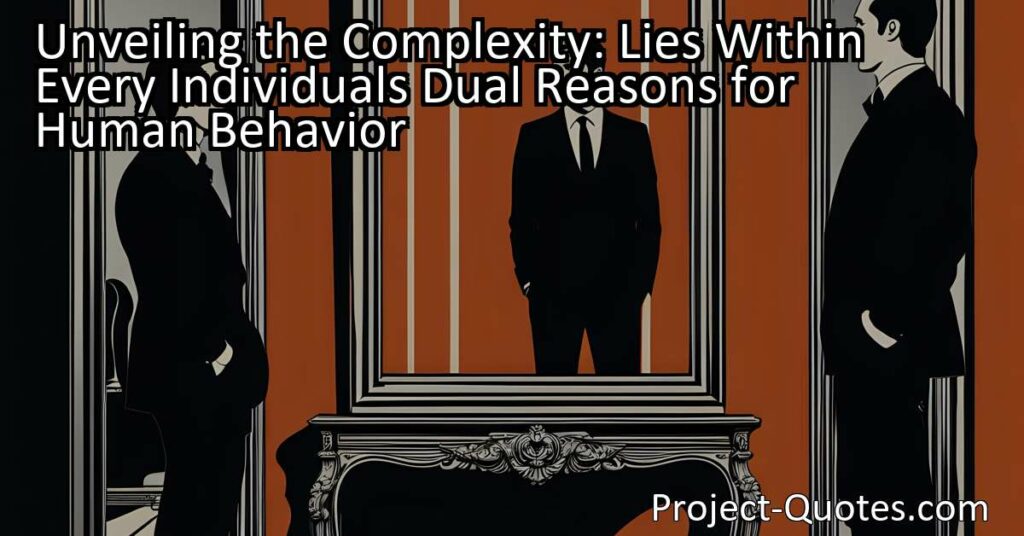A man always has two reasons for doing anything: a good reason and the real reason.
J. P. Morgan
Unveiling the Complexity: Lies Within Every Individual’s Dual Reasons for Human Behavior Explore the two reasons that drive human behavior: the “good reason” we present to others and ourselves, and the “real reason” that lies hidden within. By understanding this dual nature, we can gain insights into our own motivations and those of others, leading to more informed decision-making, a nuanced understanding of history, and stronger relationships built on empathy and compassion. The complexities of human behavior go beyond surface-level explanations and delve into the depths of our subconscious desires and fears.
Table of Contents
Meaning of Quote – A man always has two reasons for doing anything: a good reason and the real reason.
When it comes to understanding human behavior, there is an age-old saying that resonates with many: “A man always has two reasons for doing anything: a good reason and the real reason.” These words, spoken by J. P. Morgan, a prominent American financier and banker of the late 19th and early 20th centuries, still hold true in our modern society. While this quote may seem simple at first glance, its implications delve into the depths of human nature and provide a fascinating insight into why individuals behave the way they do.
One might wonder, what exactly does it mean to have two reasons for doing anything? To fully grasp the concept, we need to acknowledge the complexity that lies within every individual’s mind. Humans are known for their cognitive abilities, capable of reasoning, decision-making, and analyzing situations. However, the process behind our actions is rarely as straightforward as it may appear.
The first reason mentioned in the quote is the “good reason.” This often refers to the explanation we provide to others and, more importantly, ourselves. We like to believe that our motivations are based on noble intentions, such as morality, altruism, or personal growth. When making decisions, we tend to justify them with socially acceptable justifications, presenting ourselves in a positive light. In essence, this reason is the one we feel comfortable sharing with the world.
Consider a simple example of a student who chooses to study diligently for an upcoming test. From the outside, it might appear that their primary motive is to succeed academically or gain knowledge. These are the “good reasons” that others would readily accept and commend. However, upon closer examination, we might find the real reason lies within the student’s desire to please their parents, avoid punishment, or perhaps prove their worth to themselves and others. These hidden motives, often driven by external expectations or personal insecurities, constitute the “real reason.”
The “real reason” embodies our true motivations, the subconscious drivers that influence our behavior. It captures the intricate web of emotions, desires, fears, and needs that shape our actions. Unlike the “good reason,” which is driven by conscious thought and rationality, the “real reason” stems from deep-seated beliefs, past experiences, and hidden aspirations.
Acknowledging the existence of these dual reasons opens up a whole new perspective on human behavior. It invites us to delve beyond the surface and question our own actions and those of others. By exploring the hidden motives, we gain a better understanding of ourselves and the complexities of the human mind.
Take, for instance, a scenario where a friend cancels plans at the last minute, providing a seemingly valid excuse. Our immediate response may be to accept their explanation, assuming their “good reason” is genuine. However, if we consider Morgan’s words, we might question whether there is an underlying motive yet to be revealed. Perhaps our friend feels overwhelmed and anxious about social situations, leading them to retreat to the comfort of solitude. The canceled plans may not be a reflection of disinterest in our company but rather a manifestation of their internal struggles.
Understanding the dichotomy of reasons can also inform our interpretation of historical events, political decisions, and societal trends. History is often shaped by grand narratives that present a “good reason” to justify actions taken by individuals, groups, or nations. However, as we dig deeper, the true motivations, the “real reason,” start to surface.
Consider the American Civil War, a conflict fought over the divisive issue of slavery. While the preservation of the Union was presented as a “good reason,” it becomes evident that the underlying motivations were far more complex. Economic interests, regional pride, and power struggles all played a significant role in driving the actions of those involved. By recognizing this dual nature of human intentions, we gain a more nuanced understanding of historical events and the complexity of human nature.
In our own lives, being aware of these dual reasons can also enhance our decision-making processes. When faced with a choice, it is crucial to reflect on our motivations and identify the real driving force behind our desires. By honestly acknowledging our hidden intentions, we can make more informed decisions, align our actions with our core values, and lead a more authentic and fulfilling life.
Furthermore, understanding that others have dual reasons can foster empathy and compassion. Instead of immediately judging someone based on their actions or “good reasons,” we can pause and consider what might be the real reason fueling their behavior. This mindset shift allows us to see beyond the surface and recognize that individuals are complex beings with their own unique set of struggles, desires, and fears. This level of understanding can strengthen our relationships, promote forgiveness, and lead to more meaningful connections.
In conclusion, J. P. Morgan’s quote, “A man always has two reasons for doing anything: a good reason and the real reason,” encapsulates the intricacies of human behavior. By acknowledging the existence of these dual motivations, we gain a deeper understanding of ourselves and others. It serves as a reminder that our actions are often driven by a blend of conscious and subconscious factors. Exploring the real reasons behind our behaviors empowers us to make more informed choices, navigate complex historical events, and foster empathy in our relationships.
I hope this quote inspired image brings you hope and peace. Share it with someone who needs it today!


